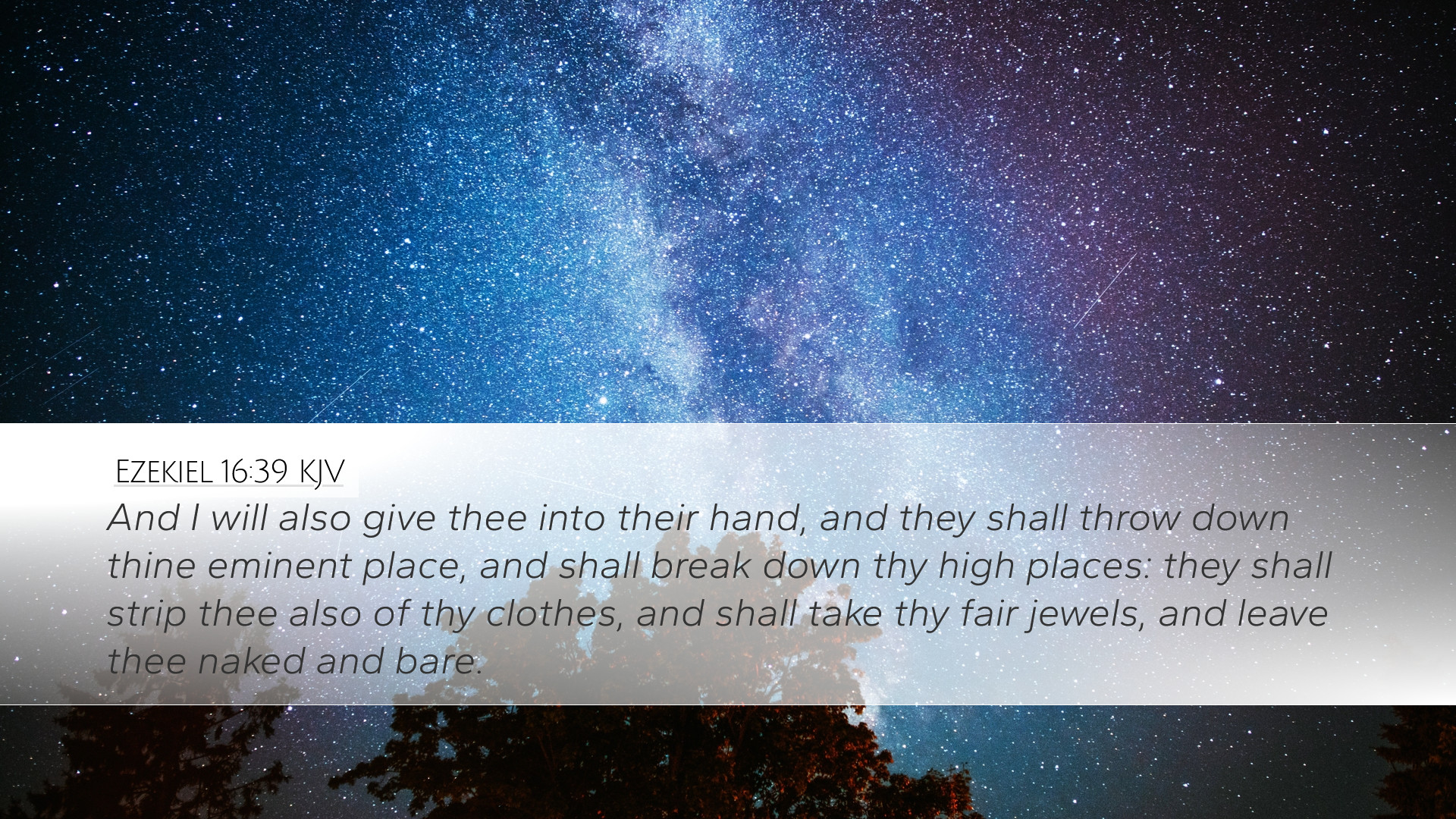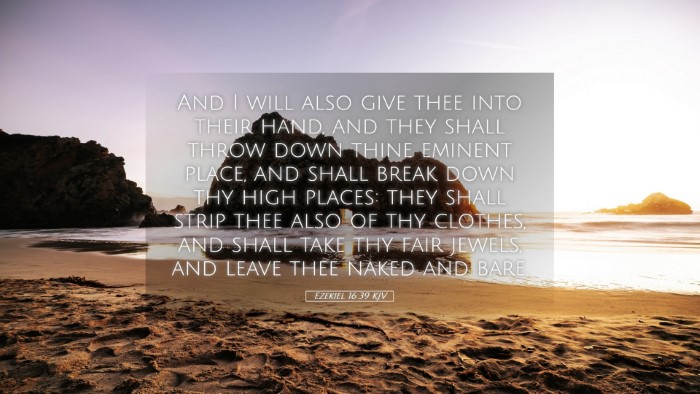Commentary on Ezekiel 16:39
Ezekiel 16:39 states, "And I will give thee into their hand, and they shall throw down thine eminent place, and shall break down thy high places: they shall strip thee also of thy clothes, and shall take thy fair jewels, and leave thee naked and bare." This verse is part of a larger allegory where God, through the prophet Ezekiel, addresses Jerusalem (symbolically represented as an unfaithful wife) and pronounces judgment upon it.
Historical Context
The historical context surrounding Ezekiel’s prophecy is critical for understanding this verse. Jerusalem is portrayed as having committed spiritual adultery through idolatry and unfaithfulness to God. Matthew Henry comments on how Israel's unfaithfulness to God led to their inevitable downfall. This chapter serves as both a statement of judgment and a reminder of the covenant that had previously existed between God and His people.
Analysis of Key Phrases
- "I will give thee into their hand": This phrase indicates God's sovereignty in allowing judgment to come upon Jerusalem as a consequence of its unfaithfulness.
- "they shall throw down thine eminent place": The 'eminent place' represents the high places and sites of worship that were centers of idolatry. Adam Clarke notes that these high places were offensive to God and led to moral and spiritual decay.
- "strip thee also of thy clothes": This metaphor signifies the complete humiliation and exposure of Jerusalem’s sins. Clarke elaborates on this stripping as a form of shame and loss of status.
- "take thy fair jewels": The 'fair jewels' symbolize the blessings and adornments that God had originally given to His people. Barnes expresses that these represent the beauty and glory that would be stripped away as judgment ensues.
- "leave thee naked and bare": This dramatic imagery highlights the ultimate disgrace and vulnerability that will befall Jerusalem. Henry emphasizes that being left 'naked' signifies losing one's dignity and standing before God and the nations.
Theological Implications
Ezekiel 16:39 captures the weight of sin and the consequences that arise from turning away from God. Theologically, this passage speaks to the idea of divine justice and the reality of judgment. The commentary from Barnes indicates that God's patience has limits, and when His people become steeped in rebellion, the resulting chastisement serves as a wake-up call.
God’s Response to Unfaithfulness
The passage showcases God’s righteous indignation against the infidelity of Israel. Clarke reminds us that God is not merely reacting; rather, His actions are rooted in a desire for His people to return to righteousness. This judgment is seen as both punitive and restorative, aimed at leading the wayward back to repentance.
Lessons for Today
For pastors, students, and theologians, Ezekiel 16:39 poses vital questions regarding the health of spiritual fidelity in contemporary contexts. As Israel faced judgment for their idolatries, congregations today may reflect on their own sources of unfaithfulness – whether they be materialism, secular ideology, or moral compromises.
- Call to Repentance: The passage is a clarion call to evaluate one’s own life and congregational practices, urging a return to the foundational truths of faith.
- Understanding Judgement: Pastoral care must incorporate the reality of divine judgment balanced with a message of grace and restoration.
- The Importance of Righteousness: Upholding righteousness in personal and communal worship remains central in avoiding the pitfalls depicted in Ezekiel's prophecy.
Conclusion
Ezekiel 16:39 illustrates the harsh realities of divine judgment against unfaithfulness but simultaneously emphasizes the importance of repentance and restoration. Historical and theological insights from commentaries by Matthew Henry, Albert Barnes, and Adam Clarke enrich our understanding of this profound passage. For modern readers, this verse compels a posture of humility and vigilance in spiritual life, serving as a reminder of God’s call to fidelity and holiness.


